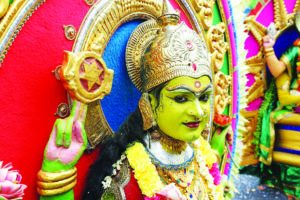Microsoft and the Museum of Art & Photography (MAP), Bengaluru, launched a new artificial intelligence-powered platform to connect artworks and cultures around the world. The platform, ‘Interwoven’ is rooted in MAPs vast collection of South Asian textiles and was developed as part of Microsofts AI for Cultural Heritage initiative, which leverages technology to empower people and organizations dedicated to the preservation and enrichment of art and culture.
 Previous projects under the initiative have involved improving accessibility through the Open Access collection of the Metropolitan Museum of Art, New York, and the digital restoration of ‘Ancient Olympia’, in collaboration with the Government of Greece.
Previous projects under the initiative have involved improving accessibility through the Open Access collection of the Metropolitan Museum of Art, New York, and the digital restoration of ‘Ancient Olympia’, in collaboration with the Government of Greece.
The MAP in Bengaluru is the first project under this initiative in India.
Speaking at the launch, Kamini Sawhney, Director, MAP, said: “Covid 19 and the lockdown really forced us to reflect on how people interacted with the online space. Right from week 1, we began looking at how we could engage with our online communities. After the pandemic, a primary aspect of our mission is to use the digital realm to connect with people across the country, and the world. We’re rethinking the idea of museums. They cannot be mere repositories of objects. MAP will not just be a collection of objects, but a space for ideas and conversations that are initiated through our collections. Interwoven fits securely within this vision?”
“Interwoven is a project that is deeply impactful to society, culture, and heritage. The project interweaves technology with art, using AI to find shared histories in artistic traditions from different corners of the globe, particularly pertaining to something as rich and complex as textiles. Our approach to AI centres around meaningful innovation and this project beautifully allows art to be more accessible and inclusive for people around the world. We stay committed to using technology to help celebrate and preserve culture as part of our AI for Cultural Heritage initiative,” adds Rohini Srivathsa, National Technology Officer at Microsoft India.
The platform works by providing users with two options. The first (Curated Journeys) allows the user to view predefined journeys, created primarily by MAP’s educational and research arm, the MAP Academy.
These combine relationships between global artefacts suggested by the AI, which are then researched and expanded further by individual curators. It is an explorative model for how AI might be used in museology and art historical research. These cover a range of themes and subjects, from ideas of anti-imperialism to representations of women, to explorations of leisure. One of the journeys, for instance, even traces the forms and functions of handbags across different cultures and time periods, shedding light on their associations with ideas of community, convenience, and haute couture.
The second option (Custom Journeys) invites general users to explore the platform to stumble upon meaningful and sometimes even surprising visual connections. It provides a new way to engage with culture and learn more about the history of textiles and fashion and their relationship to global exchange.
As part of the project, the MAP Academy has also developed a free, introductory online course on South Asian textiles, for a global audience, to further contextualize the enduring impact and relevance of textiles, addressing everything from fashion, to the environment, and global exchange. (IANSlife)



